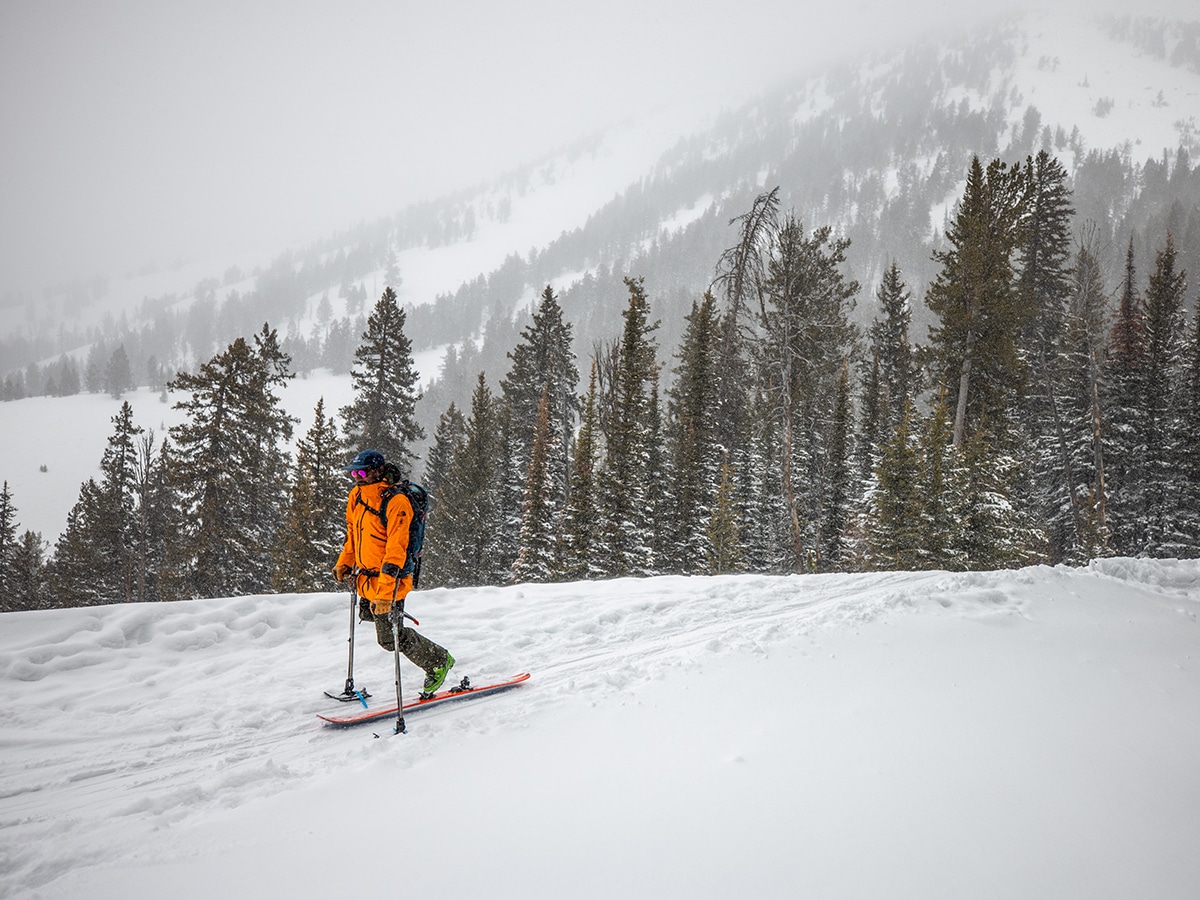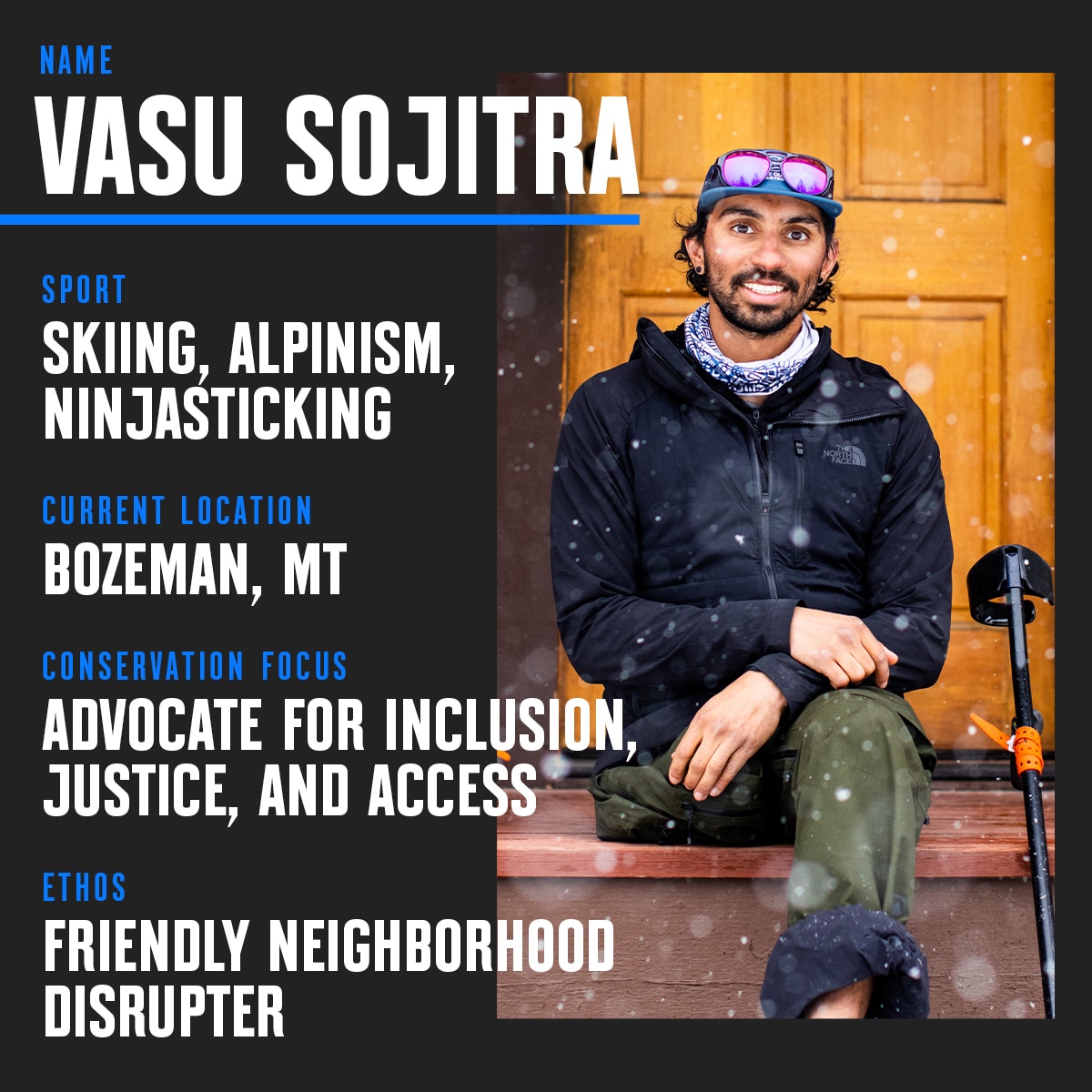Meet onX Backcountry Ambassador Vasu Sojitra
In this series, we’ll be highlighting a series of four of our Backcountry Ambassadors to shed some light on why they’ve endeavored to spend a life outdoors, what conservation means to them, and how you can play a part.
Tell us a little about yourself. Where are you from? What’s your sport of choice? How long have you been doing it?
Hi hi! My name’s Vasu Sojitra (he/him/his). I’m a visitor on the land of Apsáalooke Nation, Confederated Salish-Kootenai Tribes, Northern Cheyenne Nation, Blackfoot Confederacy, Shoshone-Bannock Tribes, many other tribes, nations, bands, and confederacies commonly known as Bozeman, Montana. I self-identify as a disabled person of color with a right leg amputation, and am Indian-American.
My motto is “#ninjasticking through the woods to bring intersectionality to the outdoors.” I’m also referred to as “your friendly neighborhood disrupter” because I tend to stir the pot of complacency when it comes to social change within outdoor spaces. I am a professional mountain athlete and a disability access strategist.
I grew up on the land of the Mohegan and Pequot tribes commonly known as Glastonbury, Connecticut. That’s where I was diagnosed with septicemia at the age of nine months. After my stay at the hospital in Hartford, our family of four moved back to Ahmadabad, Gujarat, India, to gain family support. We realized the need for better access to medical equipment and moved back to Glastonbury when I was seven. I started skiing when I was 10 and never looked back. I’m almost 30 now and have been ninjasticking in the outdoors for upwards of 20 years.
What was a catalyzing moment for you to create a life in the outdoors?
Man! There are so many. From my brother never doubting me and showing me what unconditional (tough) loves was, to watching Rocket Power and Johnny Tsunami encapsulated brown joy in the outdoors, to watching that dude with one leg ski up to me on my first day at the hill and telling me to “keep going,” to seeing a skier with Down syndrome having the time of his life skiing a green run during my work at Vermont Adaptive, to so many more. These experiences have shaped my mindset of what being outside means, why everyone needs to feel a part of our natural world and all of “them” are a part of us.
How do stewardship and preservation play a role in your career as an athlete?
What stewardship and preservation mean to me is that we have to be good ancestors so that future generations can have access to these joyous life-changing experiences that we currently have awaiting us in the natural world. We have to be in balance with the earth to truly experience the fulfillment that it brings, not just as individuals, but also to our collective communities to dissolve suffering. I love being outside because it makes me feel good about myself, more connected to the place and my community. That’s what I want to pass down through my intentional actions with the spaces around me.

What are some ways for recreationalists to easily start adopting more responsible practices? Expanding on that, what are some more intermediate/expert level stewardship opportunities that they could endeavor in?
We can all do our part by applying best practices and remember that these behaviors are a spectrum from little things like biking to work or picking up litter to massive policy changes that provide access and protect the land that we, non-Natives, are visitors on. We have to focus on strong, daily and intentional actions that will help make our world a better place to live for everyone—not just a few. And those actions mean cultivating relationships with Native communities because up to 80% of worldwide biodiversity is contained in areas managed by Indigenous peoples; a community that makes up five percent of the world’s population. We need to look at things like Landback policies that return land back to Native communities who have stewarded these lands for thousands of years! We have to fight for communities that are disproportionately impacted by climate change and environmental injustices: Disabled, Sick, Ill, Old, Native, Black, Brown, poor. This intensive process happens through deeply rooted policy changes that enact change systematically. What that means for you is showing up at the ballot box, taking part in local politics, expressing your voice even if it shakes.
How has your thinking about conservation and stewardship changed over time?
My thinking about conservation and stewardship has changed heavily over the years and the biggest catalyst that created that paradigm shift was learning how racist John Muir was. Direct quote here and please be advised for folks reading, it does have foul language toward Native peoples: “A strangely dirty and irregular life these, dark-haired, half-happy savages lead in this clean wilderness.”
These changed my view heavily on “conservation” and how compartmentalized our society became because of it. From there I started reading and learning Indigenous values to learn that we are nature and nature is us. We are all intersectional and we cannot separate society from taking care of our planet. Everyone has to do their part to the best of their ability and we need to implement policies that center on environmental justice and Indigenous sovereignty.
What’s the most inspiring thing you’ve seen in your community that ignited your excitement for the future of responsible outdoor recreation?
I’m really hopeful for the next generation and how loud-and-proud they are. Every future generation is going to do better for our world and they are proving it daily! I love the folks behind the Sunrise Movement and those behind a lot of the Transformative Justice work incorporating disability justice and access issues into the reframing of collective healing. It brings me so much hope to see tomorrow’s world today.
Where do you see the future of environmental stewardship going?
I see it fully intertwining with racial, disability, and social justices to make sure these issues are intersectional and that every community is creating a better world for all. I see the environmental justice movement representing every single community; Queer, Disabled, Black, Native, Brown, Asian, you name it! Our environment affects us all and we need to make sure all of our collective voices are at the table in making major decisions that will foster a better future for all. I’m beyond hopeful if we keep this in mind.

For more information on Vasu, follow him on Instagram.
Photos by Sofia Jaramillo.